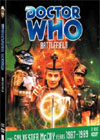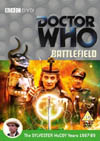DVD Extras include:
Why are these pseudo-medieval warriors going to all the trouble to "slide" over to our universe? What do they want? Though this remains vague throughout, those who focus on finding an answer to this question might begin to get their first clues at the beginning of part three, as it seems Morgaine might be after the sword Excalibur. Okay. But why does she want it? Most importantly, is there any good reason why everyone else shouldn't let her just walk over and take it? In actual fact, apparently not. We do eventually find out that she only wants Excalibur in her safe keeping to ensure that King Arthur doesn't use it to wake himself up from a cryogenic sleep. And since he's long dead, unbeknownst to her, it's all a moot point. Let her have the thing and discover it all herself. It would be good therapy for her. Indeed, Morgaine seems to be obsessed with a lover's quarrel with Arthur, in which she's forgotten what she's arguing for, but she knows she needs to win. Badly. In fact, so badly that legions of troops are brought in to a fight to the death. What she really needs is a good psychiatrist. Most of the story's energy goes into empty battle sequences, yet the sole scene of psychiatry that actually tackles the main issue feels unconvincing, succeeding only because the story must end after four episodes. One also has to wonder why the Doctor and Ace bother to remove Excalibur from the underwater spaceship, and then taunt Morgaine's forces with it for the latter two episodes, only to stick it back in the spaceship again at the end. We could have left it there all along. Most efficiently, the Doctor could have made just one trip down there, uncovering the mystery side-by-side with Morgaine, where she can be most effectively confronted with the truth about the pointlessness of her obsessions. Ultimately, I think the writer became too obsessed with his various ideas for specific scenes, battles, confrontations, and associated characters and their mythology. Lost amidst the rewrites was successful adherence to and articulation of both a solid plot and a worthy thematic point for this whole thing. From another perspective, U.N.I.T. and our local folk are faced with a particularly rowdy set of newcomers descending on them and behaving violently disrespectful. In that sense, a certain amount of "policing" them and/or containing them seems to be in order. We don't really get a sense of this being tackled reasonably, and then believably escalating out of hand. Combat starts out full-on in part one, where Brigadier Winifred Bambera has no one to confide in or voice her internal questions and concerns to, making her unsuitable as a cinematic exploring protagonist. Give her a subordinate, and a scene for the two to exchange thoughts on who the other combatants are and what this all means, and it's a different story. In later episodes, big action sequences include Bambera and Ancelyn being attacked in the woods en route to the convoy, and a major battle at the convoy itself. In both cases, Brigadier Lethbridge-Stewart has a chance to respond to these situations, and in both cases, he is seen casually leaning back in a vehicle, acting a little too relaxed, and not caring to invest in such battles thus encouraging the audience to follow suit. Perhaps if he could articulate that it's more important that he and the rest of his party go do something else, the audience could stay engaged, but we don't really get that either.
Perhaps most importantly, "Battlefield" simply has a fun atmosphere. Even if the characters somewhat fail to express goals that allow one to invest in their struggles, they're almost all still likeable enough, and understandably normal enough, that you still want to follow along with their adventures and see where it all leads.
However, once you're familiar with McCoy's Doctor, Ace, and the Brigadier, it's enjoyable to come and watch this adventure unfold between them. Also, in many ways, Courtney and Marsh seem keen for a rematch to settle old scores from their alternate roles in "The Dalek Masterplan" (story no. 21). Bring it on. The adventure boasts some cool effects for the time, including a very interesting creature design, and a number of decent superimposed effects. Sadly, the invaders' standard futuristic guns settle for dull spark charges going off instead of decent lasers though. Additionally, the process of "sliding" in this story, or to follow the terminology set forth in "Inferno" (story no. 54), moving "sideways in time", is not made all that cool by either scripting or effects work, settling for hype instead via some unconvincing maniacal laughing. Oh shame! Keff McCulloch creates much interesting music for this story, particularly when the mysterious or ethereal nature of various story elements comes to the fore. But at other times we get more synth-pop muzak that tends to jolt the viewer out of the story's context, or whining electric guitar notes that feel out of place. A strangely mixed bag.
International Titles:Deutsch: "Excaliburs Vermächtnis"Magyar: "Csatatér"Français: (Champ de bataille)Русский: "Поле брани"Today's German title translates to "Excalibur's Legacy", while the other languages remain much more literal.
This story is available on DVD and VHS video. Click on the Amazon symbol for the location nearest you for pricing and availability:
Comments on this article are welcome. You may contact the author from this page:
|








